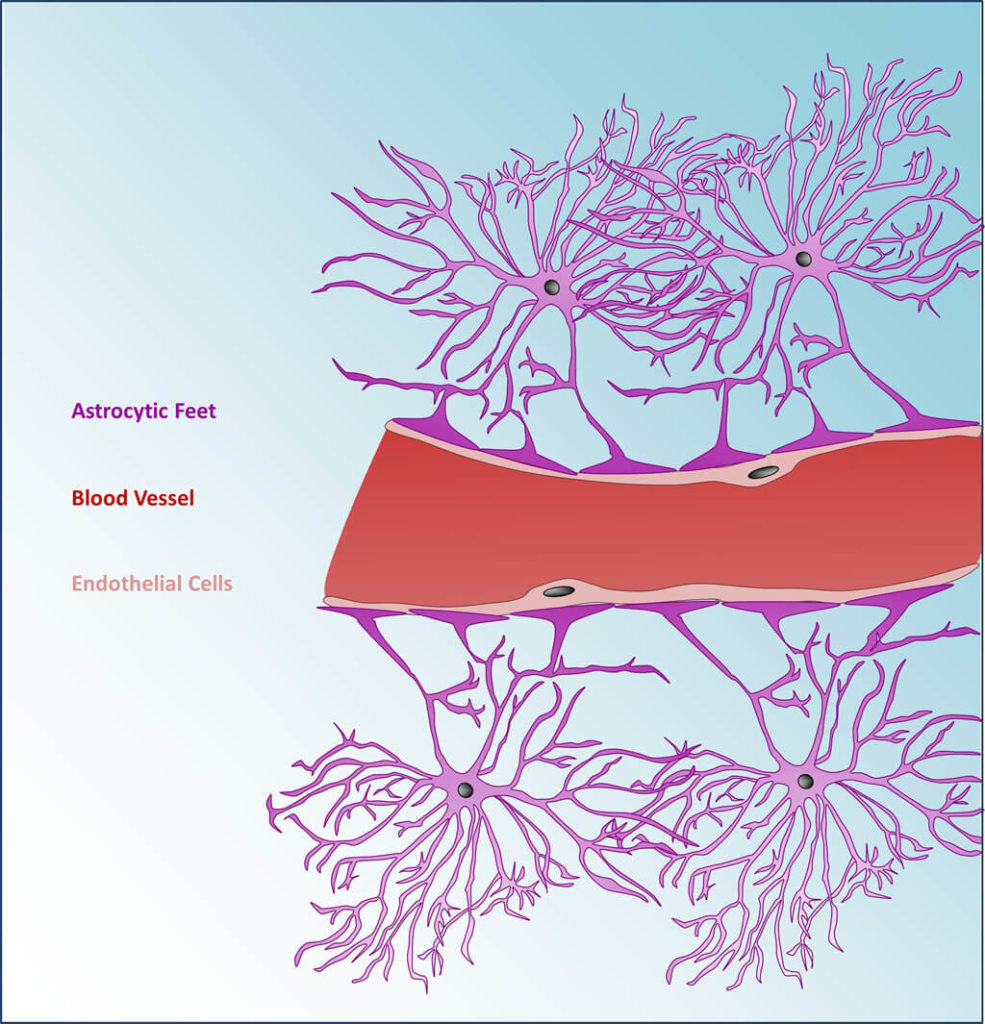What is the blood-brain barrier?
Ever wondered why when you get sick, bacteria and viruses don’t invade your brain? They can certainly find their way to other organs and different parts of your body, but why not the brain? The answer is the blood-brain barrier (BBB). The BBB is an extra layer of cellular insulation surrounding the capillaries in your brain. How important is this extra layer of blood vessel protection? In a word, “vital!” How extensive is the brain’s capillary network? Well, it’s estimated that nearly every brain neuron has its own capillary and the total combined length of brain capillaries is a staggering 400 miles!
Brain capillaries are always profuse in blood and carry critical oxygen and nutrients to the brain. Capillaries, made of mostly endothelial cells, are present throughout the body and are normally loosely linked together, letting nutrients, immune cells, and fluids in and out of surrounding tissue. In the brain, however, capillaries are closely linked together using tight junctures. This prevents pathogens from escaping into the brain at large. Think of endothelial cells/capillaries in the brain as gatekeepers that only let beneficial nutrients cross over into your brain, while keeping unwanted molecules out. Other cells in the brain join to reinforce the endothelial cells, namely astrocytes and microglia cells. Without the BBB, your brain would be directly subject to numerous harmful biologics that would eventually cause great damage to virtually all brain structures.

The “Leaky” BBB
Neuroscientists have now learned that traumatic brain injury can cause a breakdown of the BBB. Impact-induced shearing forces can cause primary vascular damage leading to a “leaky” BBB. Through this leakage, harmful substances can escape the capillaries and seep into the brain. This seepage upsets the otherwise balanced brain environment (homeostasis) causing instead toxicity to occur throughout the brain. This toxicity has been linked to over-coagulation of red blood cells reducing blood flow and causing stroke, harmful vasogenic edema (swelling of the brain) which leads to cell death, and potentially a myriad of other acute and chronic brain disorders and mental health issues, including depression, anxiety, cognitive impairment, brain fog, Alzheimer’s disease, Parkinson’s disease, headaches, migraines, chronic fatigue syndrome, attention deficit hyperactivity disorder (ADHD), and schizophrenia.
Repairing the Blood-Brain Barrier
There is currently no conventional medical treatment for increased permeability of the blood-brain barrier, and no clear criteria to make the diagnosis. The only medically accepted therapeutic approach to increase BBB integrity are glucocorticoids (synthetic cortisone). Glucocorticoids are generally the treatment for certain autoimmune disorders.
There are certain accepted dietary and lifestyle strategies that have been shown to help support and repair the blood-brain barrier.
- Avoid Gluten
- Drink Coffee
- Sulforaphane (found in broccoli, Brussels sprouts, others)
- Avoid Alcohol
- Resveratrol (found in grapes, red wine, raspberries, dark chocolate)
- Reduce Stress
- Omega-3 Fatty Acids
- Get Enough Sleep and Melatonin
- Berberine (extracted from various plants)
- B Vitamins
- Magnesium
- Alpha Lipoic Acid
- Curcumin (turmeric)
- Vitamin D
- Intermittent Fasting
- Lose Weight


